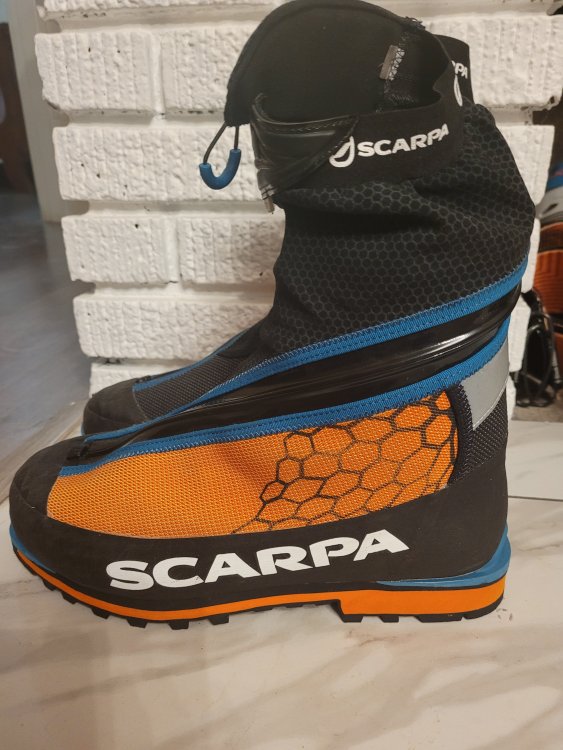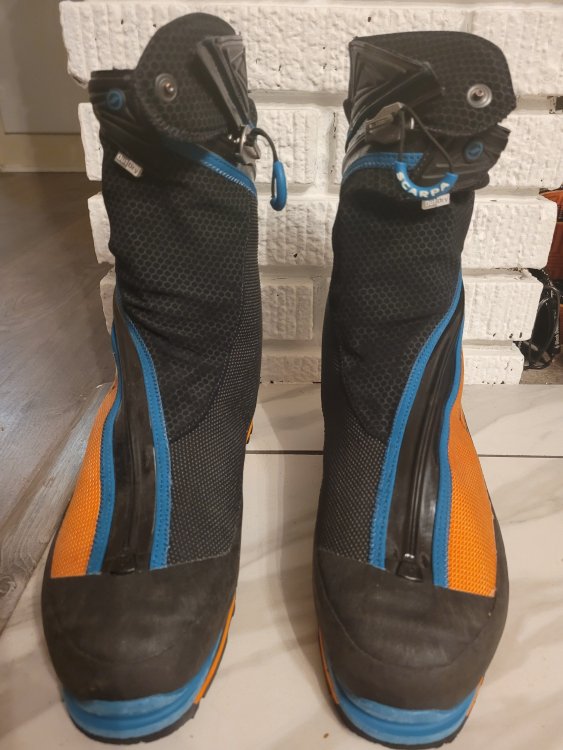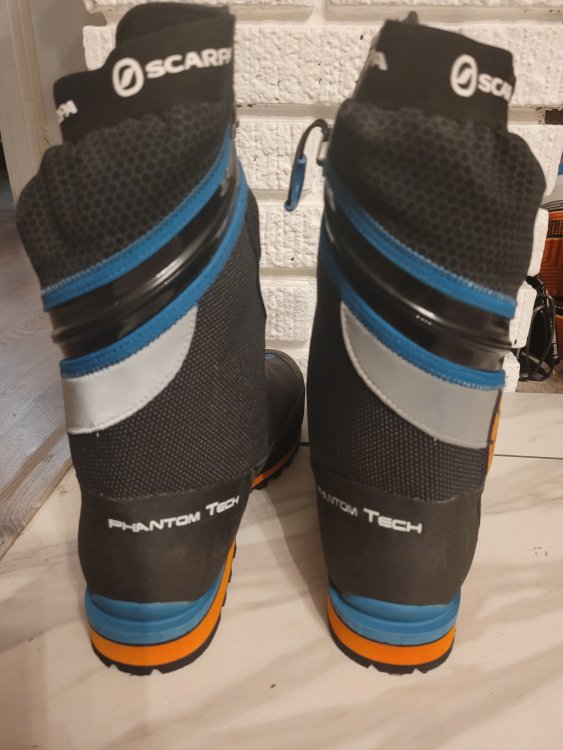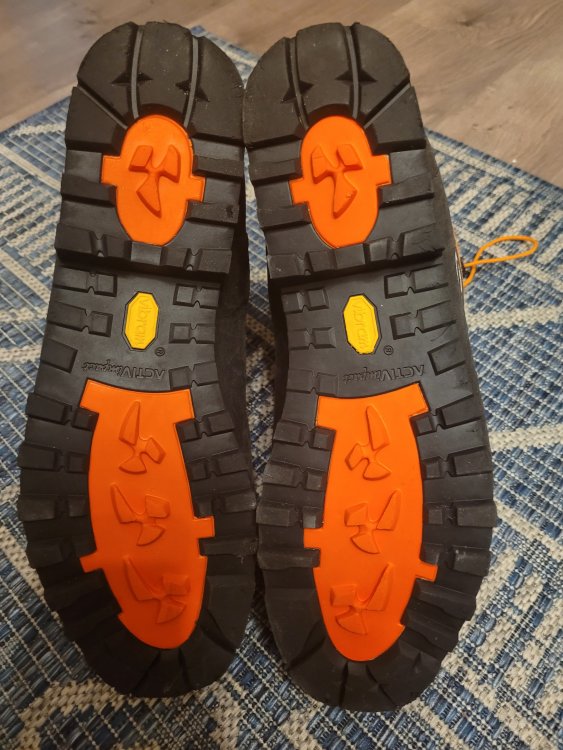-
Posts
184 -
Joined
-
Last visited
Everything posted by sparverius
-
My buddy and I are hoping to ski the Isolation Traverse Friday-Sunday, south to north and are looking for help with a ride or shuttle. Is anyone headed up the Cascade River Road Friday morning or willing to do a shuttle for us for $$$? We're hoping to leave a car at Pyramid Lake TH and get a ride to the Eldorado TH or have someone shuttle our vehicle from Eldo to Pyramid Lake TH. There are other ways to get creative to make this happen as well.
- 2 replies
-
- isolation traverse
- north cascades
-
(and 1 more)
Tagged with:
-
Nice pics J. Thanks for the invite. It was a memorable route and trip.
-
I've worn these boots 3 times. They just don't fit me. They are lightweight and warm. I live in Wenatchee and can ship to the Puget Sound area or meet you at the pass.
-
- scarpa
- ice climbing boots
-
(and 1 more)
Tagged with:
-
Looks rad Vern. Nice work.
-

[TR] Liberty Traverse and Big Kangaroo - 7/9/2017
sparverius replied to wayne's topic in North Cascades
oooh nice!!!! The Kearney-Thomas looks good. -
Castle Peak: "The Drawbridge" First Ascent of the Middle North Buttress (5.10+/A1, 10p) (Schilling-Zentler) Morgan Zentler is a baller. Last year he finished the Bulger list with a frenzied push. His suffering knew no bounds in his quest for completion. I've seen him pass out without a net or tent in a hideous swarm of mosquitoes and picked him up after an epic Stehekin-Phelps Creek traverse with Tim Halder that was the alpine equivalent of 4 marathons in a row. My tolerance for choss is limited, so it's infrequent that we can find overlapping objectives. With his choss appetite satiated, his palette has become more refined. He set his sights on an extension of the bulger list, the top 100 Washington peaks with at least 400 feet of prominence or the P400. We ticked Colfax via the Cosley-Houston in May and he followed that up with a rare ascent of Lincoln several weeks later. So when he texted and asked if I wanted to try for an FA on the north face of Castle, I couldn't refuse. It was the last peak left on his list and I was due for a good N. Cascadian adventure. We approached from Canada via Lightning Lake in Manning Park, which involves a climb up and over Frosty Mountain. Encountering deep snow at tree line, we gained the crest just short of Frosty's summit and had our first views of Castle's N face. It was obvious that the face was bare enough for an attempt, so we descended, crossing back into the states and into a snowy Princess Creek basin before traversing up on snow up to the Princess/Crow creek divide. Dropping into the Crow Creek drainage we set up camp on the only dry spot on the ridge, 2/3 of the way down to the glacier at the base of Castle's North face. We scoped the face in the last few hours of light and worked out a reasonable line up the middle north buttress. A formidable list of cascade hardmen and women have walked by this buttress over the past 30 years, and for whatever reason, passed on it, to put up first ascents on other buttresses on the complex face. We agreed on a safe and clean-looking line that surpassed the obvious roof that guards the lower third of the buttress. The approach to the face was easy at first light and we were on rock less than an hour from camp. Gearing up, we were paralyzed by the whizzing sound of falling and exploding rock overhead. The first rays of sun had loosened up choss on the upper slopes and sent down a barrage of stones. They sailed overhead and cratered on the glacier. We hustled up easy fifth to get out of the firing line, setting up a belay at the base of an incredible looking dihedral and multi-crack system. Morgan took the lead on what would be the hardest pitch of the day. Progress slowed as he encountered hard (11b) climbing after 20 meters and had to aid a short section. He traversed out of the dihedral on a tricky flake with thin pro and was soon at a flat ledge with a good belay. I traversed left up a ramp and into a crack system that led through the roof. A delicate slab (with a good nut) led into the roof, which was surmounted on the left on fun but hard cracks and stemming. The pace slowed to a crawl as the next two pitches involved a lot of cleaning. When things turned desperate, we pulled out the nut tool and excavated a crack. Where there was moss, there was often pro. The angle had eased off a bit here, but it was difficult to get good feet on dirt and moss covered slabs from the unearthed cracks. Mercifully, at the top of pitch five, the face deteriorated and we followed the obvious route in a short traversing pitch to the ridge proper. The rock quality remained sound on the ridge and the cracks no longer required excavation. With the exception of one short harder hand/fist crack, the climbing was more moderate and less stressful. In typical Cascadian fashion, the last technical pitch involved dancing delicately around teetering blocks. After ten pitches of climbing, we emerged onto moderate snow slopes 400' feet below the summit and unroped for 3rd and 4th class terrain up the ridge to the top. We lounged on the summit, 14 hours after starting the climb, and took in the views of the Pickets, Hozomeen, and the lonesome peaks in the heart of the Pasayten. The walk off of the south side and east ridge was breezy and we were back at camp as twilight faded. We celebrated with scotch whiskey and tunes on the speaker. Morgan had finished a compilation of mostly chossy peaks with a first ascent on great rock. The walk back to Lightning Lake the next day felt entirely downhill.
-
Looking for a partner to climb in Hyalite with Feb. 26th-29th. I can leave on the 25th and return on the 30th, but dates are somewhat flexible. I can lead up to WI4. Jason jwschill@gmail.com
-
I'm looking to climb in Hyalite from Feb. 26-29, leaving the 25th and driving back to WA Feb 30th. I can lead up to WI4. Dates are flexible Jason jwschill@gmail.com
-
Trip: The Himmelhorn - South Face-"Stonehenge" (FA) Date: 7/6/2015 Trip Report: The Himmelhorn, South Face First Ascent (“Stonehenge”) Jason Schilling and Tim Halder. 7/6/15. 5.10, 8 pitches 1400’ “We were born too late. Roper’s already been here. We’re just picking up his scraps.” Tim mused as we gazed up at the unclimbed South Face of the Himmelhorn. Maybe so, but he nor anyone else had ventured onto the big face in front of us. We wondered if there was a reason for its neglect as we tried to agree on a safe but proud line while lounging amongst the wildflowers of the Crescent Creek basin. I’d like to think that I’ve paid my dues in the Pickets. I spent three nights stormbound on the summit of Mt. Fury in 2008 with Donn Venema and Steph Abegg. Donn and I wore parallel sleeping grooves into the ice during that first bout of Picket's purgatory and I’d often wake up with his legs draped over mine or with his hot breath on the back of my neck. Fortunately we got along well. He invited me into the range for three extended trips in two years and became an alpine mentor and great friend to me. Donn and I sampling the bourbon at Perfect Pass during happier times (photo by Steph Abegg) The next year I was back with Donn and Steph and new partner Steve Trent. The trip came to a crashing halt when Steve was injured badly in a fall on the North Buttress of Mt. Terror. I stayed behind to care for Steve and help with his helicopter rescue and ended up spending four dark days in a coffin-sized crack waiting for another storm to clear. Although it took a while for me to recover phsychologically from that episode, I eventually emerged with a renewed passion for the mountains and climbing and a profound reverence for partnerships that make the alpine experience so worthwhile for me. That event changed my life in many ways. It exposed me to a wider circle of climbers and brought several people into my life that have since become dear friends. Tim was one of them. Tim and I were supposed to go the Sawtooths this summer to climb some of the classics and fish in the alpine lakes. A gentleman’s trip of alpine leisure. But when I asked him if he was interested in a week of route exploration in the Southern Pickets, he succinctly responded “yes sir!” Tim likes to sell himself short as a mediocre rock climber, but he has several things going for him which make him an exceptional partner on remote and unknown alpine trips. He’s an elite endurance athlete with an incredible motor. He’s also an elite joker. His accents on one pitch can range from Russian to British to Indian. But most importantly, he’s a gamer. Put him at the crag, and he’s bored and disinterested. Put him on an unclimbed face in the cascades or the Himalaya, and he steps up to the plate, big time. He’s an alpha choss-dog who’s quite capable of pulling a difficult technical move at 20,000 feet with an overnight pack on. A perfect partner for the Pickets. We shouldered monster packs on July 3rd and headed up through what Tim describes as a “medley of suffering” from the jungle of Goodell creek to a bivy at the breezy and scenic col below the Chopping Block overlooking the Crescent Creek basin and its namesake spires. Snow was scarce in the basin approaching the col and the water situation later this summer could be grim for that spot, unless the snowfield on the slopes above persists. We had our eye on the easternmost tower of the Rake as a warm up. Wayne Wallace informed me of it a few years back in the Index parking lot, mentioning that it was unclimbed as far as he knew. It looked short enough and reasonably solid. We were wasted from the approach and needed a short introductory objective to get acclimated with the Pickets. The Turret, right of center, above the Terror/Rake col After a leisurely morning at the col, we moved camp into the Crescent Creek basin amidst a collection of large boulders scattered about the heather. We were perfectly situated next to a stream with intimate views of the Crescent Creek Spires. Some snow persisted in the gully leading up to the Terror/Rake col, but soon we were directly beneath the tower, scouting our options. The rock directly above the col appeared compact and difficult, so Tim led off slightly left on loose ground. I followed with an exciting and airy pitch on improving rock. Tim took over on the final pitch as we simul-climbed easy 5th class terrain to the summit. We saw no evidence of an ascent and figured we may be the first to climb the tower. John Roper has since informed us that he had climbed it back in 1984, naming it the Turret. We were indeed picking up his scraps. Nevertheless this was a good introduction to what lay ahead. We spent the next day lounging and recovering at camp and took a leisurely stroll through wildflower meadows to scope the south face of the Himmelhorn. The South Face of the Himmelhorn, center We even had time to sew It probably sees an ascent every other year or so, by either the standard route put up by Ed Cooper, George Whitmore, Glen Denny, and Joan and Joe Firey in 1961, or the highly regarded Wild Hair Crack climbed by John Roper, Silas Wild, and Russ Kroeker in 1981. The face looked complex, but had several options. We considered the far left line that would lead past an interesting and steep dihedral before mellowing out on a long traverse of the summit ridge and its various pinnacles. The direct line looked most interesting to us, finishing on the summit tower and I was thrilled when Tim suggested it. Our plan was set for the following morning. Having nearly melted off of the first ascent of Golden Horn’s East Face the week prior with Joe Sambataro, I wanted to avoid another flirtation with heat stroke. We left our camp at four the next morning under clear skies and some of the warmest pre-dawn temps I’d ever experienced in the pickets. We were on the snow at 5 and started up easy ramps and ledges. The climbing was straightforward and fun and took us to a grassy col where we finally pulled out the rope and rack. Jason picking a line low on the South Face. Above us lay a feature we called the shield. It was three pitches of impressively solid rock. Tim led out on blocky, intermediate terrain for the first pitch and I followed with an attempt on an incredible looking dihedral. Tim start out on blocky ground on the first pitch of Stonehenge, the South Face of the Himmelhorn. I had to clean the lower part of the crack to reveal perfect hand jams but soon dead-ended at an unprotectable and flaring wide crack. I traversed left onto solid face climbing followed by a brief lieback and great hand jams. The rock went from solid to excellent as we moved higher. Jason encounters varied and solid climbing on the second pitch of ‘Stonehenge’ on the South Face of the Himmelhorn. “Tim’s Flake” on the fourth pitch Tim works past the incredible flake on the 4th pitch as the summit tower looms above Soon we were at the base of the summit tower and I lobbied for going straight up it to the summit. Surely we could find something that would go and take us to the top in 2 pitches or less. The rock was compact and steep. I had a cruxy traverse with poor feet but good protection down low and then the protection vanished. I aimed for a salvation crack 40 feet above my last possible piece of protection. The climbing was exhilarating. Pushing my fears aside, I moved past the runout difficulties to steep and joyous cracks and a belay 2/3 of the way to the top of the tower. Jason leads up the steep and runout 6th pitch. We were confronted with steep rock and sparse protection above, so Tim opted for a wild traverse on solid but unprotectable pock-marks to a notch between the summit tower and a pinnacle. Following the airy traverse of the 6th pitch The difficulties were over! He let out a whoop after reaching the notch and brought me over to his scenic belay overlooking the Mustard Glacier and wild McMillan Cirque. From there it was one cruiser pitch to the summit on low 5th class on deteriorating rock. It’s funny how so many of these N. Cascades peaks turn to rubble right at the top. I spied an old Kodak film register whose vintage seemed to be way before my time. We were amazed to find the original summit log from 1961 in the canister as well as the Roper and company’s chronicle of the Wild Hair Crack. The original summit register from 1961 We lounged on the summit for an hour, reveling in the views and the warmth, overjoyed with the climbing that was now behind us. I was overwhelmed with gratitude for this moment and the shared creative experience with Tim felt like a gift. The rest of the trip was all downhill, more or less. We spent our last night at the Chopping Block bivy, partying with the meager libations at hand, and watching Spinal Tap’s “Stonehenge,” in honor of our new route’s name. I could finally relax with the satisfaction of successfully returning to the range where I had learned and suffered so much. And it was reassuring to know that Roper had left a few blank canvases untouched and that more await for those who are willing to put in the effort. Summit or Siberia! (somehow my rotated photos reverted to their orignial state once they were uploaded to this server) Gear Notes: Double ropes, Double-cams from .4 to 3 Approach Notes: Goodell Creek to end of road, cross Terror Creek, then up up up like little hobbits to the Chopping Block ridge bivy.
-

[TR] Colonial Peak - Watusi Rodeo 2/23/2015
sparverius replied to sparverius's topic in North Cascades
Didn't look too closely at it but here you go. -
Trip: Colonial Peak - Watusi Rodeo Date: 2/23/2015 Trip Report: Stanislav and I hiked into the Colonial Basin Sunday afternoon with the goal of climbing Watusi Rodeo. This route has been high on my list since moving to Washington five years ago and has been a recurring topic of conversation for Stanislav and I at the start of each winter. The approach into the lower basin took about 4 hours. We encountered moderate but brief bushwacking once we emerged from the forest and camped low with good views of the face. We awoke early in the starry cold and were moving by 3. The upper basin is guarded by clliffs, so we scoped our approach the previous evening. In colder winters the upper basin can be gained by climbing ice gullies or mixed ground through the cliffs. But without ice down low, our only viable option was to ascend an avalanche gully near the head of the valley. We wound our way up avalanche debris and eventually low angle ice for 1000 feet to the upper slopes. The snow was in perfect condition and we were at the base of the face ahead of schedule. We rested in a moat and waited for first light to illuminate our route. Once on the face proper, the great conditions allowed us to cover ground quickly. The alpine ice was plentiful and while not offering the best protection, gave secure sticks in steeper gullies and faces. The only real problems came at the very end as I wallowed in vertical sugar snow for 100 feet to gain the summit ridge. The climb had been a dream-like meditation for me up to this point and the real threat of falling through the bottom of the elevator shook me from my reverie. At the edge of desperation I found a knifeblade placement before traversing to the cornice. Once beyond the cornice, 10 feet of rotten mixed climbing vaulted me out of the freezer and onto the sunny summit. We spent a luxurious hour on the windless top and gazed at the Pickets and beyond. We felt secure enough in the incredible conditions to simul-climb the entire face in four long pitches in just under 7 hours. We wasted an hour or two on the lower half with route finding shenanigans. The ice was thick enough on the flows to place 16cm screws. The descent was circuitous and arduous as we had to traverse the lateral moraine of the glacier almost all the way to the base of Pyramid's north face before descending mellow slopes to the upper basin. Another long traverse, a descent through a steep avy ravaged forest, and a single rappel off of a tree led us into the icy gulley leading back to the lower basin. There might have been another way to get down to the basin from the upper basin, but we could not see it from above or below. We went straight down to the creeks edge to avoid brush and blowdowns later in the forest. It really didn't matter, as the scree hopping was just as bad. Hiking out on the springy moss of the forest floor next to the creek was therapy for our weary feet. Gear Notes: 6 cams, a handful of nuts and knifeblades, 10 screws and one picket Approach Notes: We parked at Colonial Creek Campground and hiked on the left side of the creek, staying a few hundred feet above the creek to avoid cliffs above and below. If camping in the lower basin, scope out your approach to the upper basin as well as the descent route.
-
I've used Trimble's Terrain Navigator Pro on my Samsumg Galaxy S4 for the past year and love it. I'd be interested to check out the BackCountry Navigator Pro to see how it compares.
-
I've driven past it multiple times in the past week and it's gone.
-
Ruth/Icy are good ones. I'd add Challenger to the mix. Remote and spectacular views.
-
Has anyone had a peak at the NW face of Snoqualmie Mt. lately? I'm curious what kind of shape NY Gully and Pineapple exp. are in.
-
I think Tim accidentally put one of his Waddington photos in the mix and then took it out. We certainly didn't see any ice like that when we were there. There may have been decent ice higher on some of the Ogres, but we never were close to it. I think the monsoons took care of the ice before we arrived.







